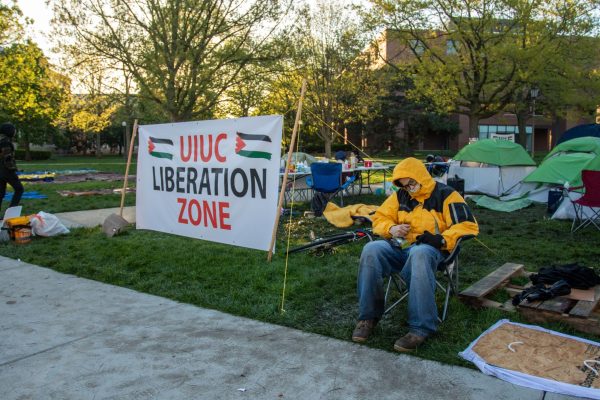University-owned land under new lease
February 4, 2005
The University’s decision to convert 20 percent of the acres in its portfolio from a crop share to a cash rent lease has incited opposition from the Illinois Farm Bureau (IFB).
According to an IFB press release, the University first discussed the new policy with the IFB Board last October. During the meeting, the IFB Board expressed its concerns with the policy.
Dennis Vercler, spokesperson for the IFB, said the new policy sticks the tenant with the risks involved in farming.
The new cash rent policy, which affects 12 of 44 University-owned farms across the state, requires tenants to bid in advance for the right to farm a portion of the University’s land. After the growing season, the tenant keeps all proceeds and crops harvested under the new policy. In a crop share, both the tenant and the landowner would assume the risks and expenses of production and would share the crops at the end of the season.
“The landowner is in a more passive position in cash rent arrangements,” Vercler said. “No matter how the growing season turns out, they already have their money from the flat fee paid up front.”
Get The Daily Illini in your inbox!
Robin Kaler, University spokesperson, said the landowner would continue to be involved with the land.
“The University does research on some of these grounds,” Kaler said. “We are very active in making sure tenants are using environmentally sound and responsible techniques.”
Kaler also said the new policy gives more people the opportunity to partner with the University since the land would be available for public bidding every five years.
The application deadline for cash rent leases closed Jan. 14, and the University received 144 bids, Kaler said.
“Now it is a matter of conducting interviews to find the people who best meet the criteria,” she said. “We are looking for a past record of working with the University, a record of maintaining the land, tenants with the capacity and equipment, and the amount of the bid.”
Kaler added that selections will be made Feb. 18 and the University’s goal is to complete contracts by Feb. 25.
“We want to move toward cash rent in the future, and we acknowledge that some properties are inappropriate for cash rent,” Kaler said. “We want to continue to be good stewards of the resources that are a part of the University’s portfolio.”
Marla Todd, information director of the Champaign County Farm Bureau, said there is concern about the long-term effects the policy would have on the land.
“The tenants who continuously farm the land in a crop share do not see it as a one-shot wonder,” Todd said. “There is a real commitment to the stewardship of the land.”
Since the University announced the change in policy, the IFB released an action request for its members to write a letter to University leaders expressing their concerns. Vercler said at least 100 letters were sent out.
Vercler also said IFB is concerned that the University’s decision will influence other institutions to adopt cash rent arrangements.
“The University is viewed as a leader in agriculture, and rightfully so,” Vercler said. “But this process might invite other institutions to change to a farm lease and the cash rent levels they (the University) receive might be used as a benchmark to increase rates across the region.”
Todd added that the University might receive negative publicity within the agricultural community.
“The agricultural community helps protect and provide research funding for the University,” Todd said. “It would not be a good idea to dampen the relationship.”
Kaler said the University will continue to work with the IFB to refine and review the policy after the first year.
“We understand change is difficult, and as you implement a new program, you want to learn from it and improve it,” Kaler said. “We are happy the Bureau (IFB) has agreed to be a part of that evaluation.”






